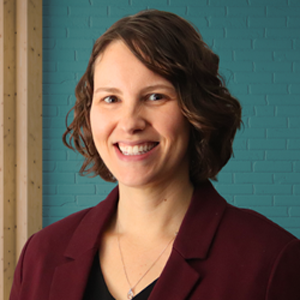Imagine trying to find somewhere to live 12,500 km away, in a city you’ve never been to. You find an online listing, pay an entire year’s worth of rent, and finally arrive in Toronto or Barrie or Sault Ste. Marie only to discover that you’re sharing a dingy basement with four other students and no fire exits. Or, perhaps worse still, that the apartment in question was never available to rent at all.
It’s an increasingly common scenario in Ontario’s housing market, and one that a parishioner at Little Trinity in Toronto is hoping to help alleviate. Rylan Kinnon has launched SpacesShared, a platform that will use technology to simultaneously help two diverse groups with their housing struggles: post-secondary students – especially international students – who need safe and affordable housing; and seniors who want to safely and affordably age at home.
Working in the post-secondary sector for the past 10 years in government, as a consultant and with related technology companies, Mr. Kinnon has had conversations with student leaders across Ontario. “All of them had housing as a top priority. And all of them particularly identified the challenges that international students face from a housing perspective,” he says.

At a time when safe and affordable housing has become increasingly difficult to find, many international students have housing budgets as low as $350-$500 a month. “It can get you a basement apartment where what should have been a one-bedroom unit has been converted into five bedrooms, there’s no fire safety and there’s limited heating and cooling. I don’t think that should be acceptable,” says Mr. Kinnon.
Meanwhile, a 2017 report from the Canadian Centre for Economic Analysis found that there are more than 5 million spare bedrooms in Ontario. A majority of seniors are over-housed, meaning they have more space than they want or need, but they may be unable to downsize or reluctant to leave their homes. A poll conducted in 2021 found that 89 per cent of seniors in Ontario planned to stay in their homes for as long as possible, particularly considering COVID-related deaths in seniors’ residences.
Aware of these facts, Mr. Kinnon started to think about models that have been piloted in Europe, the U.S. and Canada that see post-secondary students living with seniors. In exchange for more affordable rental rates, students agree to help with certain tasks around the house for up to seven hours a week. Responsibilities could include grocery shopping, basic meal prep, snow shovelling or raking leaves. All expectations are clearly stated beforehand in a written agreement signed by both the senior and the student.
“These models have been proven to have really positive health and social outcomes,” says Mr. Kinnon. “If seniors had someone in the home who could help them, it could be the difference between staying in their home, in a community they know and the space that they know, versus having to move into assisted living.”
For students, the most obvious benefit is access to a home where they can feel safe and welcome. But beyond a roof over their head, Mr. Kinnon says living with a local senior can help international students transition more successfully to life in Canada, especially coming from cultures where multi-generational living is the norm.
“Students have so much they can learn from a senior, and a senior has so much wisdom to impart,” he says. “There’s huge opportunities for these beautiful relationships to take place, where a student and a senior support each other, and that student feels more connected to Canada than they would if they had found some other approach to housing.”
While this kind of living arrangement isn’t a new concept, Mr. Kinnon hopes to use technology to help make the process as seamless as possible. Everything will be channelled through the SpacesShared platform, which has been designed to be user friendly for seniors. “We’ve tried to design it in such a way that it’s as intuitive as possible. That’s the starting point,” he says. “One of the things COVID has driven is a better understanding of technology among seniors.”
For those who may not be comfortable navigating the site themselves, his team is looking at ways they can help seniors set up accounts, or even provide access for seniors’ adult children who may want to be part of the process.
When they sign up, seniors and students will create profiles that are used to match them with potentially compatible partners. Once a senior and a student have matched, talked and decided they want to try living together, they’ll sign a housing agreement in the platform that lays out any house rules and the specific tasks the student will help with. SpacesShared will also take care of validating people’s identities and running criminal background checks when they sign up.
Mr. Kinnon says he knows issues will arise when any two people live together, so SpacesShared will initiate check-ins with both students and seniors at regular intervals to make sure everyone is happy with how things are going. “If any issues arise in the relationship, we’re going to follow up with a phone call. We’ll aim to mediate any challenges that come up,” he says. “We hope we can catch challenges early and make sure we can resolve them.”
As things get going, the team is looking at more ways of matching compatible seniors and students. “We’ll continually be improving the algorithm so we’ll be able to match better and also potentially identify traits or characteristics that might lead to tension and make sure we match people as effectively as possible,” he says.
They’re also looking at matching students based on their area of study with seniors who worked in that field. This could provide opportunities for mentorship, a perspective on what it’s like to work in the field and potentially a champion with contacts and connections in the industry.
Mr. Kinnon is reaching out to Anglican communities not only because there are seniors among their members, but because he hopes people will be inspired by their faith, just as he is. “My parents have always said I’m very justice-motivated, generally. Especially when I think about the call to feed the hungry and house the homeless and take care of folks,” he says. “What a beautiful way to show to someone what your faith means, to provide an affordable room in a safe, caring environment where you also can demonstrate that you do live your life differently.”
He’s started attending clericus meetings in the diocese to speak with clergy about SpacesShared. He hopes that if several seniors in the same community decide to open their homes, they could provide support to each other as they navigate their new relationships.
He acknowledges that this kind of arrangement isn’t a good fit for everyone, but he encourages seniors to think about whether hosting a student could improve their lives at the same time as helping someone else. “If you have a space in your home, if you have a bedroom that is being used for storage, just think about the value that that room could provide to someone else,” he says. “It’s there, it has no one in it, and it can provide warmth and shelter for someone who needs it. And we at SpacesShared will be alongside for the journey.”
Anyone who wants to learn more about SpacesShared can visit www.spacesshared.ca.


